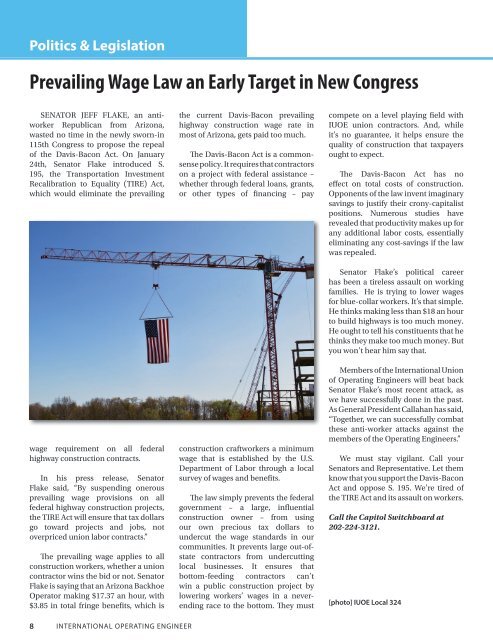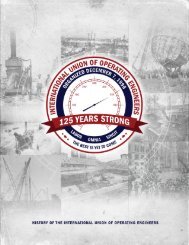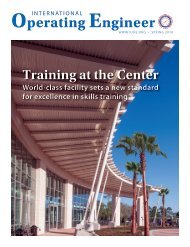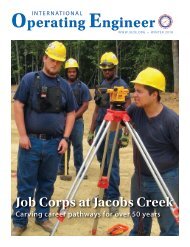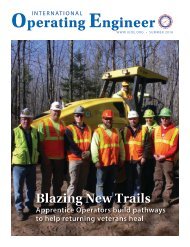International Operating Engineer - Winter 2017
The quarterly magazine of the International Union of Operating Engineers.
The quarterly magazine of the International Union of Operating Engineers.
You also want an ePaper? Increase the reach of your titles
YUMPU automatically turns print PDFs into web optimized ePapers that Google loves.
Politics & Legislation<br />
Prevailing Wage Law an Early Target in New Congress<br />
Anti-worker “Right-to-Work” Laws Advance in States<br />
SENATOR JEFF FLAKE, an antiworker<br />
Republican from Arizona,<br />
wasted no time in the newly sworn-in<br />
115th Congress to propose the repeal<br />
of the Davis-Bacon Act. On January<br />
24th, Senator Flake introduced S.<br />
195, the Transportation Investment<br />
Recalibration to Equality (TIRE) Act,<br />
which would eliminate the prevailing<br />
wage requirement on all federal<br />
highway construction contracts.<br />
In his press release, Senator<br />
Flake said, “By suspending onerous<br />
prevailing wage provisions on all<br />
federal highway construction projects,<br />
the TIRE Act will ensure that tax dollars<br />
go toward projects and jobs, not<br />
overpriced union labor contracts.”<br />
The prevailing wage applies to all<br />
construction workers, whether a union<br />
contractor wins the bid or not. Senator<br />
Flake is saying that an Arizona Backhoe<br />
Operator making $17.37 an hour, with<br />
$3.85 in total fringe benefits, which is<br />
the current Davis-Bacon prevailing<br />
highway construction wage rate in<br />
most of Arizona, gets paid too much.<br />
The Davis-Bacon Act is a commonsense<br />
policy. It requires that contractors<br />
on a project with federal assistance –<br />
whether through federal loans, grants,<br />
or other types of financing – pay<br />
construction craftworkers a minimum<br />
wage that is established by the U.S.<br />
Department of Labor through a local<br />
survey of wages and benefits.<br />
The law simply prevents the federal<br />
government – a large, influential<br />
construction owner – from using<br />
our own precious tax dollars to<br />
undercut the wage standards in our<br />
communities. It prevents large out-ofstate<br />
contractors from undercutting<br />
local businesses. It ensures that<br />
bottom-feeding contractors can’t<br />
win a public construction project by<br />
lowering workers’ wages in a neverending<br />
race to the bottom. They must<br />
compete on a level playing field with<br />
IUOE union contractors. And, while<br />
it’s no guarantee, it helps ensure the<br />
quality of construction that taxpayers<br />
ought to expect.<br />
The Davis-Bacon Act has no<br />
effect on total costs of construction.<br />
Opponents of the law invent imaginary<br />
savings to justify their crony-capitalist<br />
positions. Numerous studies have<br />
revealed that productivity makes up for<br />
any additional labor costs, essentially<br />
eliminating any cost-savings if the law<br />
was repealed.<br />
Senator Flake’s political career<br />
has been a tireless assault on working<br />
families. He is trying to lower wages<br />
for blue-collar workers. It’s that simple.<br />
He thinks making less than $18 an hour<br />
to build highways is too much money.<br />
He ought to tell his constituents that he<br />
thinks they make too much money. But<br />
you won’t hear him say that.<br />
Members of the <strong>International</strong> Union<br />
of <strong>Operating</strong> <strong>Engineer</strong>s will beat back<br />
Senator Flake’s most recent attack, as<br />
we have successfully done in the past.<br />
As General President Callahan has said,<br />
“Together, we can successfully combat<br />
these anti-worker attacks against the<br />
members of the <strong>Operating</strong> <strong>Engineer</strong>s.”<br />
We must stay vigilant. Call your<br />
Senators and Representative. Let them<br />
know that you support the Davis-Bacon<br />
Act and oppose S. 195. We’re tired of<br />
the TIRE Act and its assault on workers.<br />
Call the Capitol Switchboard at<br />
202-224-3121.<br />
[photo] IUOE Local 324<br />
IN JANUARY, Kentucky became the<br />
27th “right-to-work” state in the United<br />
States, joining every other state in the<br />
South.<br />
For the first time in decades,<br />
Republicans took control in the<br />
Kentucky House of Representatives in<br />
the 2016 elections. They wasted no time<br />
enacting anti-worker policy. Governor<br />
Matt Bevin, who surprised election<br />
watchers and pollsters by winning<br />
the governor’s race in 2015, actively<br />
supported “right-to-work” throughout<br />
the election cycle.<br />
Once anti-worker majorities were<br />
in place in both chambers of the<br />
legislature, they didn’t waste any time.<br />
Within weeks of convening, legislation<br />
to repeal the state prevailing wage and<br />
enact “right-to-work” were sent to the<br />
Governor for his signature.<br />
Unfortunately, that is not the only<br />
bad news from the elections of 2016.<br />
IUOE-backed candidates lost races for<br />
governor in two key states that are now<br />
likely to go “right-to-work:” Missouri<br />
and New Hampshire.<br />
HHHH ACTION ALERT HHHH<br />
New Missouri Governor Eric<br />
Greitens says he will sign “right-towork”<br />
legislation when it gets to his<br />
desk, making the “Show Me” State the<br />
28th state in the country to intervene<br />
in labor-management negotiations to<br />
prohibit “union security” clauses.<br />
Other parts of the country are<br />
not exempt from the challenges in<br />
the Midwest and the South. New<br />
Hampshire currently has a “right-towork”<br />
battle on its hands. The IUOEbacked<br />
candidate lost to Republican<br />
Governor Chris Sununu, and,<br />
unfortunately, he is expected to sign<br />
“right-to-work” legislation, perhaps<br />
even by press time. It would become<br />
the first state in New England to pass<br />
such laws.<br />
With twenty-nine states likely to<br />
be “right-to-work” this year, it will not<br />
be long before anti-union politicians<br />
attempt to push a national “right-towork”<br />
bill in Congress. Senator Rand<br />
Paul (R-KY) sponsored the law in the<br />
past, with the support of the Senate<br />
Majority Leader Mitch McConnell.<br />
• Fight back against national “right-to-work” legislation.<br />
• Visit www.StopRTW.org for more information.<br />
• Call your Senators and Reps at the Capitol: 202-224-3121<br />
• Tell them to “right-to-work” is wrong for America.<br />
WHAT IS<br />
“RIGHT-TO-WORK?”<br />
“Right-to-work” laws insert<br />
the government into labormanagement<br />
negotiations,<br />
eliminating “union security”<br />
clauses in collective bargaining<br />
agreements. These “union<br />
security” clauses simply<br />
require workers who benefit<br />
under a collective bargaining<br />
agreement (CBA) to pay their<br />
fair share for its administration.<br />
To negotiate a major contract, it<br />
takes time, legal costs, financial<br />
research, strategic sense, and<br />
commitment to get the job<br />
done. To put it simply, a good<br />
CBA is a lot of work.<br />
Union security clauses do not<br />
require union membership.<br />
No one can be forced to join<br />
an organization in the United<br />
States of America. “Rightto-work”<br />
laws compel union<br />
officials to provide services to<br />
workers under the agreement<br />
without asking the worker<br />
to pay his/her fair share to<br />
support the maintenance of<br />
the agreement. “Right-to-work”<br />
laws even allow an individual<br />
worker to avoid the union’s<br />
cost for taking up a grievance<br />
on their behalf. Yet the union<br />
still has a duty to represent<br />
the worker. “Right-to-work” is<br />
wrong. It is wrong for workers,<br />
employers, and they’re simply<br />
un-American.<br />
8<br />
INTERNATIONAL OPERATING ENGINEER<br />
WINTER <strong>2017</strong> 9


